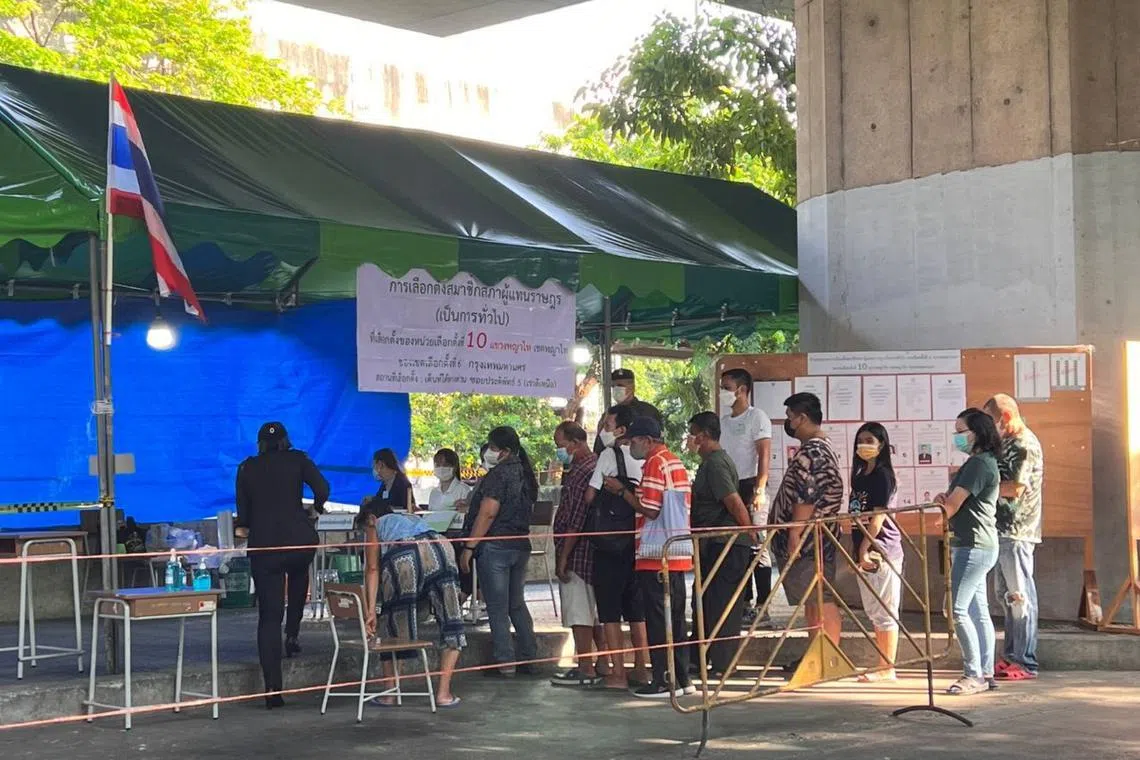Thailand election: Polls close after calm and uneventful voting
Sign up now: Get insights on Asia's fast-moving developments
BANGKOK – Thais turned out in droves at the ballot box on Sunday, after weeks of intense campaigning
Voting, which took place from 8am to 5pm Bangkok time (9am to 6pm Singapore time), was largely peaceful and uneventful. Preliminary results are expected to be known by 11pm the same day.
Caretaker Prime Minister Prayut Chan-o-cha, 69, a former army chief who has helmed Thailand since staging the 2014 military coup,
He is up against the Pheu Thai Party,
Mr Srettha cast his ballot in Bangkok shortly after polls opened at 8am, while Mr Prayut did so about an hour later.
“Today is a very important day for Thais. May all Thais come out to vote,” Mr Srettha told reporters. Mr Prayut had a similar message.
There are about 52 million eligible voters in this election, and Thailand’s election commission has said it expects 80 per cent of them to cast their ballots. In the 2019 election, 74.69 per cent of the electorate cast their votes.
Ms Sariya Kanrayanamit, a voter in Bangkok, was upbeat about the changes that will come from this election.
“I think a lot of people will come out to vote this time round, because we want to give Thailand a new future,” the 50-year-old accountant told The Straits Times after she had cast her ballot at a school in the capital’s Watthana district. “I’m excited about the leader who’s going to emerge from this.”
Sunday’s polls were held under new rules
Although Pheu Thai’s two previous iterations were dissolved over electoral fraud, it has wielded a commanding lead in opinion polls
Pheu Thai has pitched its experience in economic rescues, dating back to the days when the government under its predecessor Thai Rak Thai party steered the kingdom to recovery after the Asian financial crisis of 1997-1998.
To install a prime minister, however, requires a party to win more than a simple majority in the 500-seat Lower House. Under a system brought into effect by the junta that governed before 2019, an appointed 250-seat Senate gets to vote alongside 500 elected representatives on who becomes premier.
Analysts expect the Senate to continue to back a conservative, royalist candidate like Mr Prayut.
Pheu Thai has declared it will not tie up with coup-makers to form a government. This rules out a much rumoured alliance with the Palang Pracharath Party, the leader of the ruling coalition now helmed by caretaker Deputy Prime Minister Prawit Wongsuwan. Mr Prawit, also a former army chief, was part of the junta which ran Thailand from 2014 to 2019.
Sunday’s polls were the first since mass youth protests broke out in Thailand in 2020. While initially triggered by the dissolution of the progressive Future Forward Party, the demonstrations grew into a larger movement demanding monarchy reform and a downsizing of military influence, among other changes.

Residents queueing to vote in Bangkok when the polls opened at 8am local time on May 14.
ST PHOTO: STEPHANIE YEOW
While the street protests have fizzled out, some of their key demands have been taken on by the Move Forward Party (MFP),
Its large following among young voters has sparked a pushback from conservatives. The UTN has dialled up calls to protect the monarchy, with Mr Prayut warning on Friday against attempts to “overturn” the nation.



